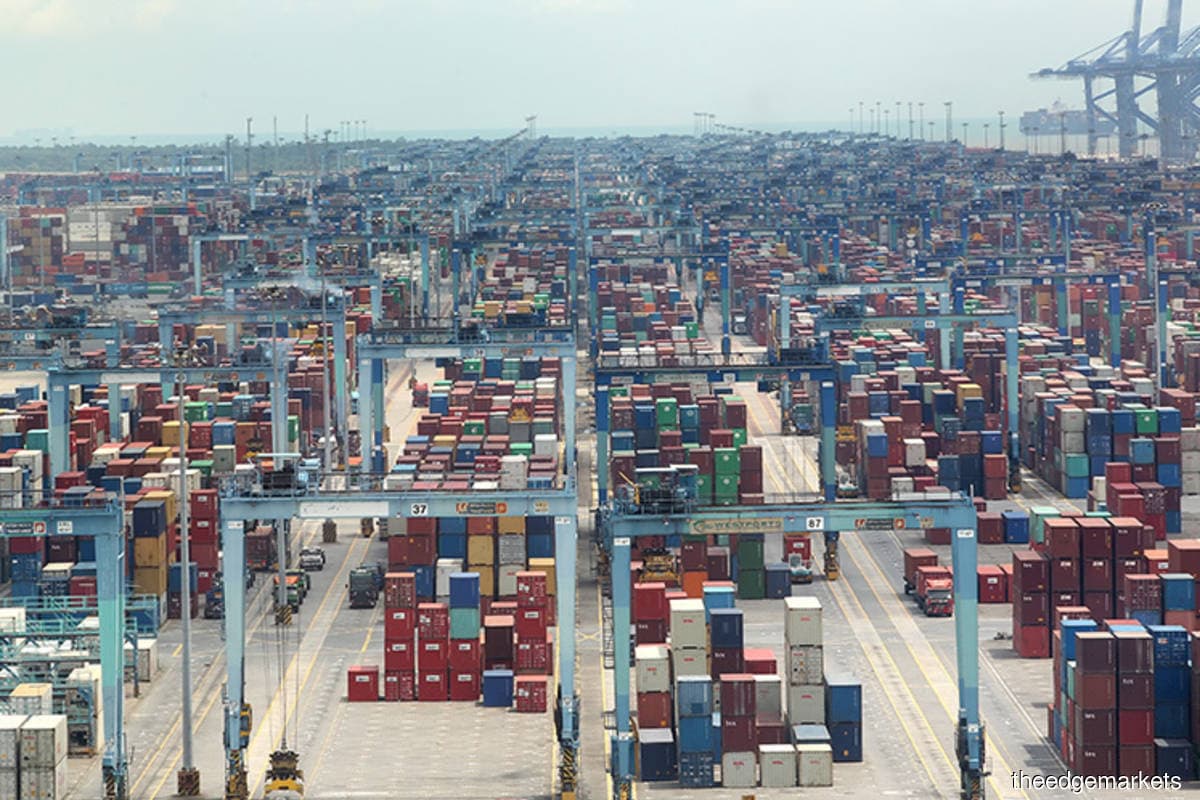
KUALA LUMPUR (Dec 19): Malaysia’s November 2022 trade rose by 15.6% year-on-year (y-o-y) to RM238.17 billion, marking the twenty-second straight month of double digit annual growth, according to Malaysia External Trade Development Corporation (Matrade).
It was also the highest monthly value for the month of November, it said in a statement on Monday (Dec 19).
According to Matrade, imports were higher by 15.6% to RM107.93 billion, while the trade surplus increased by 15.6% to RM22.3 billion.
The export growth was underpinned by strong exports of electrical and electronics (E&E) products, liquefied natural gas (LNG), petroleum products, as well as crude petroleum.
Exports of manufactured goods, which accounted for 84.6% of total exports, grew by 15% y-o-y to RM110.23 billion, marking the 16th straight month of double-digit expansion. The growth was underpinned by E&E products and petroleum products.
Exports of mining goods (with a 8% share) soared by 62.6% y-o-y to RM10.43 billion, the 20th successive month of double-digit growth led by higher exports of LNG and crude petroleum.
However, agriculture goods (6.8% share) declined by 11.1% to RM8.87 billion y-o-y due to lower exports of palm oil and palm oil-based agriculture products.
Matrade said that among the major exports, E&E products — which were valued at RM53.16 billion and accounted for 40.8% of total exports — rose by 32.1% from November 2021.
Petroleum products (RM12.33 billion, or 9.5% of exports) increased by 26.4%; chemicals and chemical products (RM7.16 billion, 5.5% of exports) increased by 9.9%; while LNG (RM6.62 billion, 5.1% of exports) surged by 69.5%.
However, palm oil and palm oil-based agriculture products (RM6.81 billion, 5.2% of exports) shrank by 14%.
Meanwhile, exports to major trading partners, notably Asean, the US, the European Union (EU) and Japan, also expanded by double digits.
Compared with October 2022, the trade surplus rose by 23.5%, while a contraction was seen in trade (-2.8%), exports (-1%) and imports (-4.9%).
From January to November 2022, trade expanded by 29.9% to RM2.613 trillion, compared to the same period last year.
Exports increased by 27.2% to RM1.42 trillion. Imports rose by 33.3% to RM1.193 trillion, and the trade surplus edged up by 2.6% to RM227.89 billion.
Trade to slow in next three to six months
Trade growth for the next three to six months is expected to slow down amid moderating global growth and tighter monetary policy conditions.
According to analyst Chin Yee Sian of RHB Investment Bank Bhd, despite continued expansion in exports for the upcoming months, it will be at a softer pace.
“Weakness in manufactured and commodity-based products exports might be more pronounced in 1H23, following the moderation in global demand.
“Notwithstanding the weakness from the external front, Malaysia’s economic growth is expected to remain robust amid continued support from domestic economic activities, supported mainly by resilient consumer spending and stable labour market conditions,” said Chia in a research note on Monday.
The research outfit maintained a full-year export growth projection at 27.9% y-o-y for 2022.
Meanwhile, MIDF believes that the continued rise in global demand for E&E, petroleum and palm oil products will support Malaysia’s export outlook, going forward.
Although the rate of growth has been moderating and more normalised because of the diminishing low base effect, MIDF still expects imports to grow, as domestic demand will continue to increase next year.
“While we foresee external trade will grow further despite slower global growth next year, we keep a cautious view on several downside risks that could drag down trade outlook in 2023,” said MIDF.
Some of the risks are heightened recession and possibility of deeper slowdown in global growth, collapse in final demand amid elevated inflation and increased borrowing costs, and possible escalation of geo-political tensions and trade war.
According to senior economist of UOB Global Economics & Markets Research Julia Goh, although exports are expected to moderate next year, regional trade pacts will likely give a boost to exports.
“Positive developments that will augur well for Malaysia’s trade outlook include the ratification of the Regional Comprehensive Economic Partnership (RCEP) Agreement and the Comprehensive and Progressive Agreement for Trans-Pacific Partnership (CPTPP) Memorandum of Cooperation (MOC) signed between the US and Malaysia to expand semiconductor supply chain resilience,” said Goh.
She added that the EU has just announced 10 billion euros to be mobilised as part of the Global Gateway to accelerate infrastructure investments in Asean countries, that will focus on energy, transport, digitalisation, education, and promotion of trade and sustainable value chains.